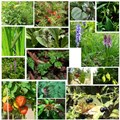
Using medicinal plants can help you greatly in preventing many diseases. Medicinal plants are being used in Healthcare for a long time now, and have led to the production of plant-based medicines. Various phytochemicals are found in plants and are being used in healthcare for making drugs and medicines.
What are medicinal plants?
Medicinal plants are herbs rich in medicinal properties; people have been using these herbs since prehistoric times. Their history dates back to 3000 BCE when they were first discovered mentioned in a tabloid of Sumerian civilization. The main benefit they provide is prevention from certain diseases, although it is still unknown how much efficacy these plants show. Various studies and research are being done on medicinal plants to find out how much they benefit us.
Plants produce phytochemicals and other biochemicals and enzymes to form defense mechanisms against insects, herbivorous animals, disease. These phytochemicals are used as drugs and other pharmacological uses.
Chemicals Found in Medicinal Plants:
Alkaloids
Alkaloids are the naturally occurring nitrogen compounds, largely found in the plant kingdom. Many of them have medicinal properties that are used in the treatment of various diseases like malaria, diabetes, cancer, cardiac dysfunctions, etc. They are also anti-platelet agents that aid platelet-related blood conditions.
Glycosides
Glycosides are often found in medicinal plants such as aloe vera, rhubarb, cascara, etc. They are used as cardiac glycosides, which include digoxin and digitoxin. Glycosides are powerful drugs and support the beating of the heart.
Terpenes
Terpenes or terpenoids are the phytochemicals found in various plants such as medicinal and resinous. They have a strong aroma that keeps the herbivores away. Their scent makes them useful in making essential oils and perfumes. Some terpenoids also have antiseptic properties and are used in medicines.
















